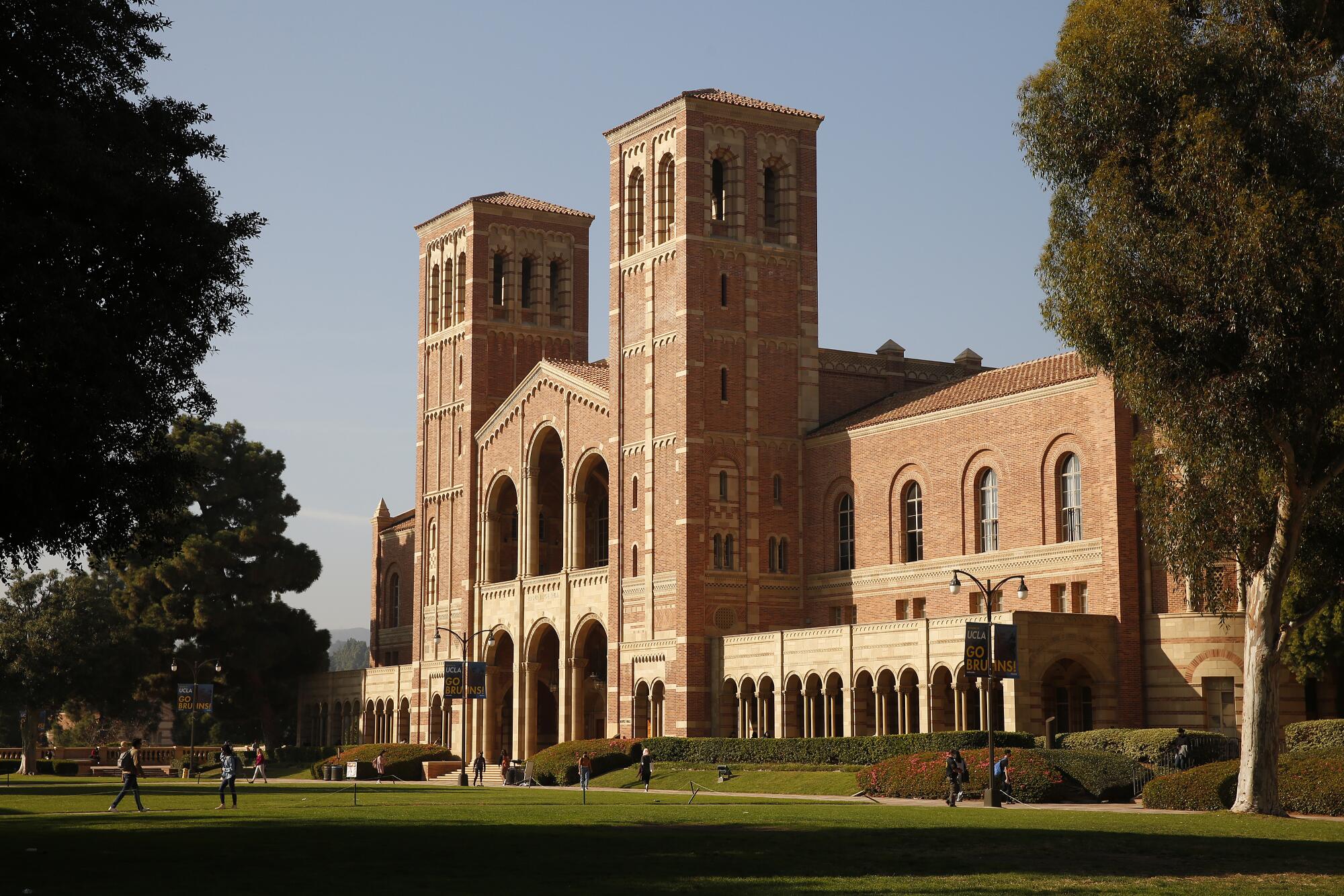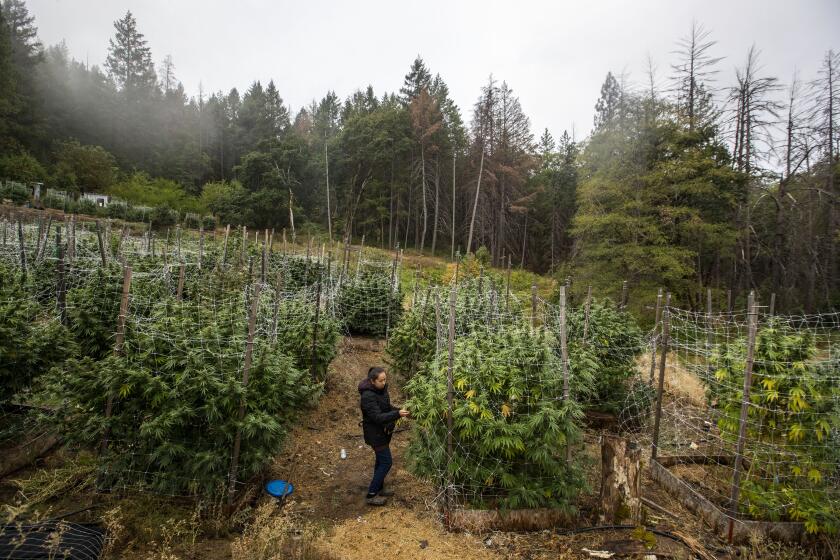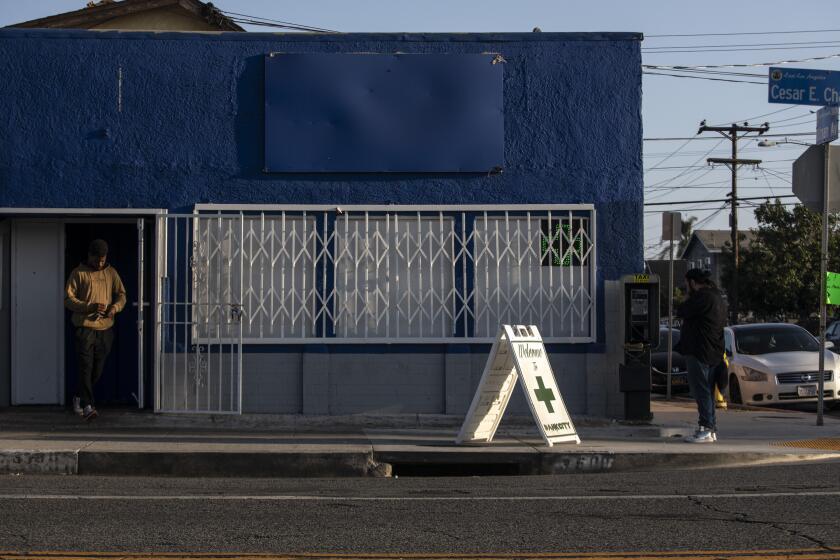
- Share via
When UCLA started its cannabis research initiative five years ago, the university hailed the undertaking as one of the first academic programs in the world dedicated to studying the health effects of pot.
Legalization was quickly taking hold around the country, and the cannabis industry was attempting to transform the plant’s image from an illicit substance that gets you high to a health and wellness product.
The Times asked UCLA officials whether the university accepted donations from the industry to support the program. They said no.
However, documents obtained by the newspaper, eventually released by UCLA under the California Public Records Act, show that cannabis companies and investors provided at least some of the early financial support, writing checks for tens of thousands of dollars in donations and assisting with fundraising events.

Subscribers get exclusive access to this story
We’re offering L.A. Times subscribers special access to our best journalism. Thank you for your support.
Explore more Subscriber Exclusive content.
The industry support underscores potential conflicts of interest as pot goes mainstream and researchers try to assess the health and other effects of cannabis. A marijuana investor and foundations with ties to the newly legal cannabis industry have donated millions of dollars to university research programs studying claims of the plant’s medical virtues, raising questions about how independent the scientific research can be.
Harvard, the Massachusetts Institute of Technology and UC San Diego are among the schools that have accepted multimillion-dollar gifts in recent years.
At a New York fundraiser in 2019 hosted by members of the cannabis industry, the UCLA program’s executive director at the time appealed for donations, promising groundbreaking research into pot’s potential to treat a variety of serious diseases, according to a video of the event reviewed by The Times. He told the audience that the research would be crucial to ensuring that cannabis remain legal and available to future generations.
Those kinds of comments trouble academic ethics experts, who warn that the cannabis-related donations echo past efforts by various industries, most notably Big Tobacco, to bankroll scientific research in which they have a vested interest in the outcome. A 2003 study showed a link between donations from industry and research outcomes favorable to the donors.
Commercial cannabis resulted in corruption and questionable conduct that has rocked local governments across California, a Times investigation found.
“Should universities accept money from Marlboro to study the benefits of smoking or Coca-Cola to study the benefits of sugar?” said John Ayers, a public health professor at UC San Diego. “Both of these analogies are universally unacceptable because of the self-evident potential conflicts of interest and a legacy where for-profit companies have routinely interfered with the science.”
The universities accepting the funds have embarked on research that aims to fill a significant void in scientific knowledge about the health effects of cannabis, a gap caused in part by the federal government’s decades-long classification of cannabis as a Schedule I controlled substance. The classification is reserved for drugs considered to have no currently accepted medical use and have high potential for abuse. The possession of recreational cannabis by adults is now legal in 21 states and Washington, D.C., and weed has become a multibillion-dollar business.
California’s legalization of recreational cannabis in 2016 ushered in a multibillion-dollar industry estimated to be the largest legal weed market in the world. But many of the promises of legalization have proved elusive. In a series of occasional stories, we’ll explore the fallout of legal pot in California.
The cannabis industry markets the compounds of the plant — both the substance that produces a high as well as nonpsychoactive chemicals such as cannabidiol, known as CBD — as health and wellness products and even a potential cure-all for some ailments, like insomnia and chronic pain.
Among the largest gifts was a $9-million donation in 2019 to MIT and Harvard by Charles Broderick, an alumnus of both schools and an investor in Canadian cannabis businesses, according to Harvard’s gift announcement. Broderick gave $4.5 million to each university for research into how cannabis affects human health. MIT researchers will also be looking into whether cannabis can treat schizophrenia.
Other announcements have been less transparent about donors’ ties to the cannabis industry.
The Wholistic Research and Education Foundation partnered with the Ray and Tye Noorda Foundation to make a $4.7-million gift in 2018 to fund a UC San Diego study into whether cannabis can treat autism, according to the university’s gift announcement. The foundations partnered again to give $740,000 to the University of Utah to research how cannabis affects the brain, the school said.
The news releases didn’t mention that the founders of a CBD products company serve in key positions at both foundations.
The Wholistic foundation partners with companies in the cannabis industry to support cannabis research, according to the nonprofit’s website, and said it takes “a ‘venture philanthropy’ approach to our work by identifying the top researchers and having our Medical Advisory Committee collaborate with them in study design.” The foundation is also sponsoring a UC Irvine study into whether CBD and cannabis can effectively treat anxiety.
Andy Noorda, who has been chairman and co-founder of Wholistic and an officer at the Ray and Tye Noorda Foundation, said he became interested in cannabinoids as a treatment after seeing it help his son, who struggles with cerebral palsy. He said he applied a CBD cream to his son’s arm, and for the first time the child was able to relax his arm enough to open his hand.
He downplayed his ties to the industry, saying that he and Wholistic’s other co-founder, Pelin Thorogood, sold their business two or three years ago. He has a 13-acre hemp farm in Utah where he produces cannabinoid distillates, he said. But he said he’s never made money off cannabis and is not part of “Big Cannabis,” merely running a “farm that’s barely trying to make it.”
“I’m not trying to make money. I’m really trying to make a product to help people,” Noorda said.
In a statement to The Times, Thorogood said none “of the studies included companies or products with whom we had any association, and thus, there was no conflict of interest at any time.”
In Trinity County, boom-and-bust cycles are part of history. Legal weed promised to be an economic shot in the arm. But that expectation quickly collapsed.
Officials with the universities say that the foundations have had no involvement with the research and that they’ve faced no pressure to produce results that would favor the industry.
“I never got any indication as to what kind of findings they were hoping to get,” said Jace King, a researcher working on the University of Utah study.
King said preliminary findings indicated that CBD on its own has no more effect on brain activity than taking a placebo.
“Harvard has stringent rules that shield against undue donor influence and interference,” a Harvard Medical School spokesperson said in an emailed statement to The Times. “Donors have no role in the conceptualization, design, execution, or analysis of the research, do not have access to or a right to review unpublished data and do not have any influence over the peer-reviewed publication of the research findings.”

UCLA, meanwhile, initially declined to publicly disclose the identity of donors to its Center for Cannabis and Cannabinoids. Dr. Timothy W. Fong, a senior researcher with the UCLA program, told The Times that the university accepts no funding from cannabis businesses. A spokesman with the university also denied that the program received industry funding.
However, after multiple requests from The Times, the university eventually released a list of donors showing that some gifts did come from the cannabis industry.
Donors included GSW Creative Corp., which sells cannabis vape pens; NuggMD, a company that makes an app connecting patients with physicians who recommend cannabis; Ventura County Cannabis & Wellness, which has been acquiring dispensaries; Archytas Ventures, a cannabis investment firm; and the Atlantic Group FPPM Inc., a furniture company co-founded by cannabis industry investor Roger Abramson.
The university listed the identity of the donor of a $50,000 gift as “anonymous.”
Asked about these donors, Fong said he wasn’t aware of all donations to the program. He added that he and his team have walked out of meetings with cannabis companies that wanted to fund specific projects because he found their requests “unscrupulous.”
Gifts from businesses and people serving the industry and disclosed on the donors list amounted to more than $100,000.
That doesn’t include other fundraising help. Members of the cannabis industry have hosted at least two fundraisers for the center, according to university records.
The program’s research director has also received millions of dollars in grants from the National Institutes of Health, a federal government agency that funds biomedical research.
Some in the cannabis industry are eager to drum up studies that would bolster the already widespread marketing claims.
Scientific credibility is the “missing link” in establishing trust with customers, according to a web post by Trailblazers, a cannabis industry booster group, announcing a partnership with the Wholistic foundation.
It was also a “key takeaway” from its gathering of cannabis business leaders at a ski resort in Utah in 2019, the post said.
Illegal cannabis farms are engulfing parts of California and exploiting farmworkers who labor in squalid, deadly conditions, a Times investigation finds.
Among the speakers at the Trailblazers event was Jeff Chen, the founder and then-executive director of the UCLA initiative. Chen had been personally soliciting the industry for donations, speaking at fundraisers and promising research into cannabis’ potential to treat cancer, Alzheimer’s and the opioid addiction crisis gripping the nation.
At a 2019 fundraiser held in New York’s trendy Tribeca neighborhood, Chen said the studies would be instrumental in making sure the public will always have access to cannabis, which remains federally illegal and which some states still prohibit. The fundraiser was held by the cannabis arm of the marketing firm ForceBrands, which donated $25,000 to the UCLA program, according to donor records.
“If we do these studies, using natural, democratized, generic cannabis plant, you have essentially created the precedent as to why the cannabis plant should always be allowed, for all future generations,” Chen said in a video of the event reviewed by The Times.
Chen has cultivated other ties to the industry, having been an investor or an advisor with several companies associated with cannabis, according to his LinkedIn page.
It’s unclear whether those relationships existed while he was the UCLA cannabis program’s executive director. Chen stepped down from the position in June 2020 after questions from The Times and public records requests about his fundraising. His LinkedIn page stated that some investment and advisory positions began that same year, but also says he was an investor starting in 2018 in Solo Sciences Inc., which sells authentication technology to cannabis companies to prevent counterfeiting.
In a statement to The Times on Wednesday, Chen said he “had no financial interests in any cannabis companies while serving as executive director” of UCLA’s program but “did serve in volunteer advisory roles in cannabis-related organizations in areas such as education, research, and event/conference production.”
He said that he “never promised positive study outcomes in his research presentations” and that all donors and donations for the program were vetted by an independent UCLA commission, which rejected some.
Asked about Chen’s industry relationships before he stepped down, officials with UCLA Health and the David Geffen School of Medicine said they were unaware of any potential conflicts of interest related to Chen’s employment with the university and his relationship with cannabis interests.
“Staff and faculty are expected to conduct themselves in a manner consistent with high ethical standards,” the statement said.
Some donors said that they were aware their gifts could create the perception of a conflict of interest but that they weren’t pushing for research to result in any specific benefits for the industry.
The success of illegal cannabis shops and the struggles of legal ones in the heart of L.A.’s Eastside offer a stark illustration of how California’s legalization of marijuana has gone wrong.
Alex Milligan, the co-founder of NuggMD, which gave the UCLA program $50,000 in 2017, said he gave because of the dearth of research into the plant’s medical uses.
Milligan said his company’s gift came with no strings attached. He said he has no influence over the program’s research.
“What I can definitely attest to is the rigor ... to make sure that that risk for conflict of interest is not present whatsoever,” Milligan said.
Private industry funding of biomedical research has become increasingly common over the decades, to the point where it is now the largest source of funding for research. Past studies have shown industry-funded research has a greater tendency to produce results favorable to the industry, according to Joanna Cohen, professor of disease prevention at Johns Hopkins Bloomberg School of Public Health.
“The research is strong enough that we know the source of the funds is problematic,” Cohen said. “There’s no reason to think cannabis will be any different.”
In 2003, a study conducted at the Yale School of Medicine found that industry-funded studies were 3.6 times more likely to produce outcomes favorable to their sponsors.
Biomedical researchers say there are greater safeguards in place today than in the past. Academic journals where studies are published require more transparency, and usually include conflict of interest sections for the authors to disclose financial ties.
Raphael Gruener, professor emeritus at University of Arizona’s College of Medicine and an expert on cannabis research, said such reforms have left him less concerned about conflicts of interest in university studies. But those reforms rest on the university’s willingness to disclose funding sources, he said.
“If you insert this kind of protected anonymity, it raises the question, is this biased research funding, or is it objective?” Gruener said.
After leaving his post at UCLA, Chen teamed up with Thorogood, Wholistic’s president, to start the research company Radicle Science, which for a price will conduct studies on behalf of cannabis businesses and other supplement makers. In one study involving 3,000 participants, the company claims to have found that botanical products containing CBD relieved anxiety and improved sleeping, quality of life and general well-being.
The Radicle Science website says its research will allow businesses to “get objective proof to enable strong claims, drive revenue” and asks whether they’re ready to “finally show your product wasn’t just placebo.”
More to Read
Sign up for Essential California
The most important California stories and recommendations in your inbox every morning.
You may occasionally receive promotional content from the Los Angeles Times.
















